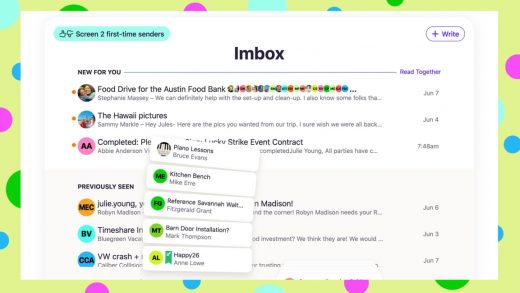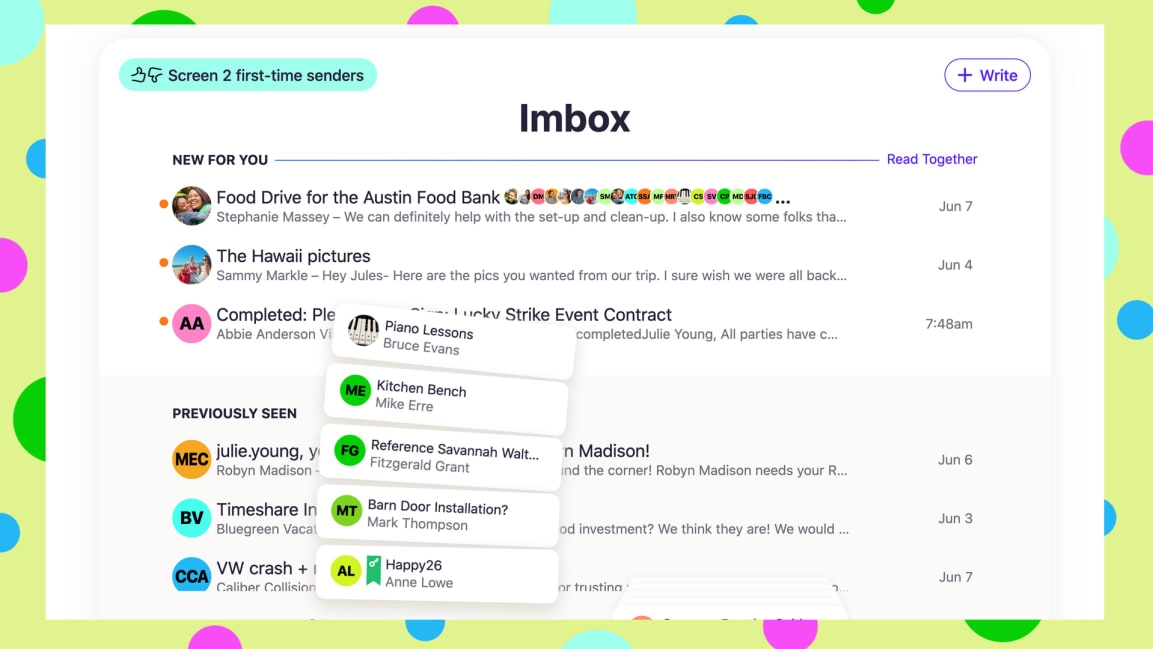Meet the Big Tech critic behind Hey, Basecamp’s radical new email platform
Silicon Valley has plenty of critics, but not many of them are tech company founders. Fewer still regularly tweet about breaking up Google, quitting Facebook, and holding Tesla to account for its Autopilot failures.
No wonder David Heinemeier Hansson, cofounder and CTO of Basecamp and creator of web application framework Ruby on Rails, has over 400,000 Twitter followers.
“A handful of companies have colonized the web, and they’re choking it,” he says. Don’t get him started on venture capital firms.
Two years ago, he and fellow Basecamp cofounder and CEO Jason Fried decided to do something about it. The culmination of that work is a paid, $99-per-year email service called Hey, which launches today. Along with protecting users from the types of invasive surveillance tactics that have become de rigueur online, Hey also contains some radical ideas about the way that modern correspondence should work. Silicon Valley will be watching the product closely: Consumers like to say they value their privacy, but are they finally willing to pay for it?
From tech founder to tech critic
Until recently, Hansson and Fried were mostly content to nurture their profitable project management software business, which has existed in some form since 1999, and write books advocating for their ideas on topics like remote work and productivity. It’s not a bad life: Hansson lives in Malibu with his family and makes time for a serious car racing hobby (he won his class at Le Mans in 2014).
A handful of companies have colonized the web, and they’re choking it.”
David Heinemeier Hansson
For Hansson, comfort with those rhythms started to change after the 2016 election, during which political data firm Cambridge Analytica provided the Trump campaign with private information about Facebook users, obtained without their consent, in order to assist the campaign with voter targeting. The episode, which a whistleblower came forward to publicly describe in March of 2018, revealed the dark underbelly of Facebook’s highly profitable ad targeting machine.
“It wasn’t Cambridge Analytica in and of itself, it was the Pandora’s box it opened in terms of laying bare the way the industry actually worked,” Hansson says.
He started to do his homework on ad tech and privacy, and was increasingly horrified by what he found. In December of 2018, after running a series of targeted ads on Facebook and feeling “disgusted” by how invasive it could be, he announced that Basecamp was becoming a “Facebook-free” business: no Facebook ads, no presence on any of Facebook’s platforms, and no Facebook-based login. In January of this year, he testified before Congress in a hearing on online platforms and market power alongside three other technology business leaders (including the CEO of Sonos, who is locked in a legal battle with Google).
“At first I was a little cynical, to be honest, that I was just going to show up and deliver my little speech,” Hansson says. “When you’re on Twitter a lot, you’re in the bubble of thinking that everyone is paying attention to the same things you know. Then you get into the real world. It felt like we were delivering new information to Congress.”
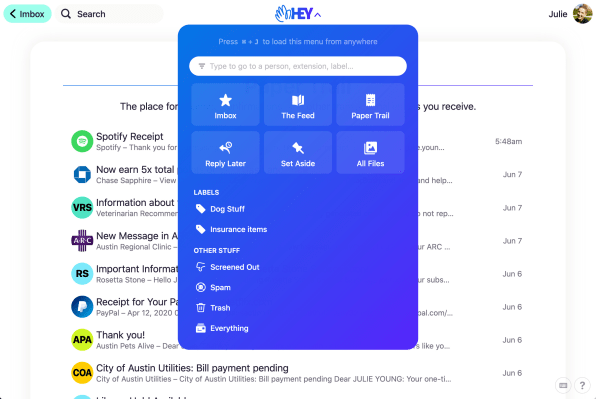
He walked away from the experience with a newfound sense of purpose. “We need stringent and overdue legislation, we need to break up monopolies, and we need to give consumers better alternatives,” he says. That last piece became a personal and professional refrain: “Abstinence-only advocacy doesn’t work. Effective advocacy needs to present compelling alternatives.”
A complete reimagining of email
Most people haven’t tried a new email service since Gmail launched 16 years ago, if not earlier. A handful of startups have played around with email interfaces in the years since, trying to make the experience cleaner and mobile-friendly, but no one has touched concepts as foundational as the inbox itself.
Hansson and Fried argue that now is the time to do just that. They have made several radical changes to the inbox, the most glaring of which is that you, the email recipient, have control over who is allowed to appear there. That means you screen all first-time senders.
They’ve also separated out what they call the “The Feed” and the “Paper Trail,” so that there are distinct places for emails like newsletters and shipping confirmation notices. Because The Feed requires opt-in confirmation, it’s much more pleasant to browse than Gmail’s cluttered Promotions tab. It’s also more private: Hey strips incoming messages of the tracking tools known as spy pixels that have become common practice in many emails. (The service indicates any emails that originally had tracking capabilities by displaying a small binoculars icon next to them.)
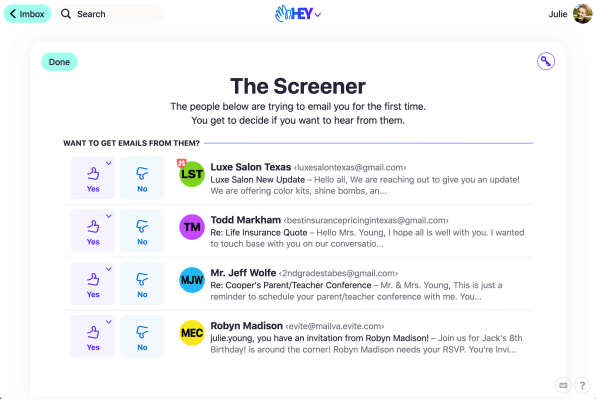
Overall, the idea behind the Hey and its $99 annual price tag is to make email peaceful, rather than distracting. In my testing of a beta version, Hey largely fulfills that promise. If anything is lacking, it’s an integrated calendar. I didn’t mind the extra upfront work associated with prescreening; thanks to smart design choices, the payoff feels worthwhile. I also appreciated that my “human intelligence” (such as it is) obviated the need for a black-box algorithm to do the work of sorting on my behalf.
For Hansson, that is the essential difference between Hey and its competitors. “Email is getting turned into the [Facebook] News Feed. It’s an editorialized inbox that the likes of Google have designed for you,” he says. Reporting by The Markup earlier this year, for example, found that some Democratic presidential candidates’ email updates were getting sent to spam, while others were reliably claiming prime inbox territory. “It’s the same power that Facebook sits on; it’s their moral prerogative whether to use it. I don’t think that’s good. I think it’s completely dystopian.
“We’re turning that on its head,” he adds. “The only curation in your inbox is what you do through your choices.”
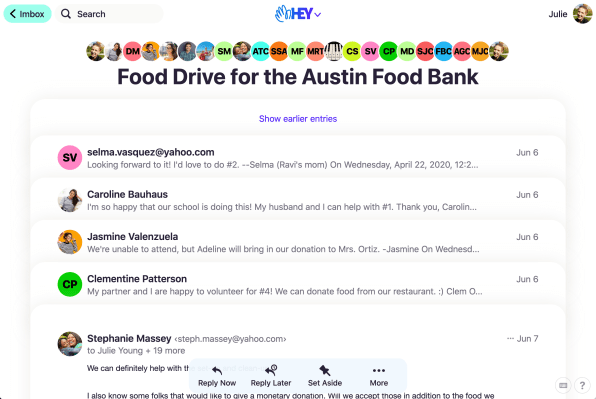
So far, over 40,000 people have joined the Hey wait list. Access to the service starts today, on a rolling basis: “200,000 customers would be an overwhelming success for us, but would also be a drop in the bucket,” Hansson says. (Basecamp has grown over the years to serve 3.3 million users.)
Hansson’s goal, if anything, is to generate enough buzz and momentum to put real pressure on email’s entrenched market leaders, and the technology industry more broadly. “We can’t rely on the people who created the problems to solve the problems,” he says. “We have to look for solutions outside of Silicon Valley.”
(47)

